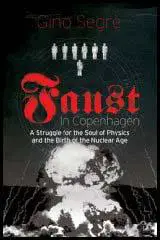Spartacus Review
Volume 21: 27th June, 2008
Science

Title: Faust in Copenhagen
Author: Gino Segre
Editor:
Publisher: Pimlico
Price: £12.99
Bookshop: Amazon
Spartacus Website: Atom Bomb
Category:
In April 1932, about forty mostly young scientists attended Niels Bohr's Copenhagen Institute for their week-long once-a-year freewheeling physics conference. For many, it would come to represent the last gathering where they were able to conduct such discussions in the spirit of camaraderie and in a milieu that felt safe. There was much talk that April about new findings, about their careers and about political events in their own countries, but the core of their discourse was physics. The neutron had been discovered two months before the meeting and the first experimentally induced nuclear transmutation had been achieved just the week before they gathered in Copenhagen. The era of nuclear physics, of nuclear power, of big science and of large-scale experiments had begun. The events of 1932 would change the direction of their research and of their lives.These discoveries also brought with them the first glimmerings of the nuclear weapons that would move physicists into the arena of international power struggles. "Faust in Copenhagen" centres on the lives and careers of seven physicists.
Six of them - Niels Bohr, Paul Ehrenfest, Lise Meitner, Wolfang Pauli, Werner Heisenberg and Paul Dirac - had been sitting in the front row at the Copenhagen meeting, and were already in the pantheon of physics greats. The seventh, Max Delbruck, was the author of a skit concluding the meeting, in which the junior physicists poked fun at their elders. As a version of Goethe's "Faust", adapted to embrace the complexities of contemporary physics, the skit eerily foreshadows many events that unfolded in subsequent years. Indeed it touched upon the very soul of science: a Faustian struggle between good and evil, between peaceful uses of scientific discovery and destructive ones and on the interface of the political and scientific worlds.
